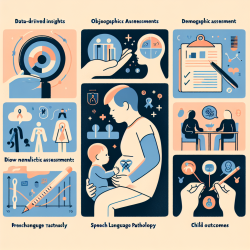Introduction
The increasing prevalence of depression among African American adults highlights the importance of understanding the social determinants of health (SDOH) that contribute to mental health disparities. The research article "Social Determinants of Health and Depression among African American Adults: A Scoping Review of Current Research" provides valuable insights that can be implemented by online therapy practitioners to enhance their services and address these disparities effectively.
Key Findings from the Research
The scoping review, guided by Healthy People 2030, categorized SDOH into five domains: Economic Stability, Education Access and Quality, Health Care Access and Quality, Neighborhood and Built Environment, and Social and Community Context. The majority of studies focused on the Social and Community Context domain, particularly discrimination and social support. Notably, no studies examined Health Care Access and Quality.
Discrimination and Social Support
- Discrimination: Approximately 81% of studies reported a direct positive association between discrimination and depression. This includes everyday discrimination, past discrimination, and racial discrimination.
- Social Support: Social support, particularly from family and religious communities, was found to mitigate depressive symptoms. This highlights the importance of a supportive social network in mental health outcomes.
Economic Stability
Economic hardship and financial strain were significant predictors of depressive symptoms. Employment status and childhood socioeconomic status also played crucial roles in mental health outcomes. Addressing economic challenges can thus be a vital part of therapeutic interventions.
Neighborhood and Built Environment
Neighborhood disorder and social cohesion were significant factors affecting depression. The historical impact of residential segregation and redlining has contributed to neighborhood disadvantages, further exacerbating mental health issues among African American adults.
Education Access and Quality
Although less studied, educational attainment was shown to have a protective effect against depression, particularly for women. This underscores the need for more research on how educational quality and access impact mental health.
Implications for Online Therapy Practitioners
Online therapy practitioners can utilize these findings to improve their services in several ways:
- Address Discrimination: Incorporate discussions on discrimination and its impact on mental health into therapy sessions. Validate clients' experiences and provide coping strategies.
- Enhance Social Support: Encourage clients to build and maintain strong social networks, including family and community support, to buffer against depressive symptoms.
- Economic Interventions: Assist clients in managing financial stress through resources, referrals, and therapeutic techniques focused on economic stability.
- Community and Neighborhood Focus: Recognize the impact of neighborhood conditions on mental health and incorporate community-based strategies to address these issues.
- Educational Support: Advocate for educational opportunities and support clients in overcoming barriers to education, recognizing its long-term mental health benefits.
Encouraging Further Research
While the scoping review provides a comprehensive overview, there are gaps that need further exploration. Practitioners are encouraged to stay informed about ongoing research and contribute to the body of knowledge through their practice and collaborations with researchers.
To read the original research paper, please follow this link: Social Determinants of Health and Depression among African American Adults: A Scoping Review of Current Research.










